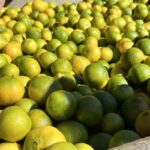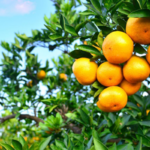Scientists develop eco-friendly pesticide alternative using citron juice

Researchers at the Southern Federal University (SFedU), in Russia, have unveiled a groundbreaking eco-friendly alternative to harmful pesticides, harnessing the power of citron juice, Gulf Agriculture reported.
This innovative development has the potential to mitigate the 14% of global crop losses attributed to post-harvest pathogens, offering a sustainable solution to a critical challenge in agriculture.
Published in the journal Discover Nano, this research represents a significant leap forward in sustainable agricultural technology. The international team, which includes experts from China, India, and Poland, developed this method as part of Russia's Priority 2030 national research initiative.
“This technology could revolutionize harvest protection,” stated Dr. Sudhir Shende, the lead researcher at SFedU. “Our green-synthesized silver nanoparticles demonstrate remarkable antimicrobial activity against several phytopathogenic molds responsible for devastating post-harvest losses.”
Laboratory tests have showcased impressive antifungal properties against notorious agricultural adversaries such as Aspergillus niger, Aspergillus flavus, and Alternaria alternata. These fungi are known for causing substantial losses in crops globally, and traditional control measures often involve chemical pesticides that pose risks to both health and the environment.
The research utilized citron juice to synthesize silver nanoparticles, a process described by Dr. Tatyana Minkina, head of the Soil Science Department at SFedU, as “remarkably simple and cost-effective.” She highlighted the method’s environmentally friendly nature and its potential for large-scale industrial application.
“What makes this development especially promising is its capacity for mass implementation,” explains Dr. Minkina. “We have established a sustainable process that can be scaled up without sacrificing environmental benefits or effectiveness.”
The timing of this discovery is crucial, as agricultural producers globally are increasingly seeking alternatives to toxic pesticides and fungicides that maintain crop protection efficiency without adverse environmental impacts.
This advancement aligns with a broader global movement toward sustainable agricultural practices. The researchers believe there is significant potential to refine their method further, paving the way for even more effective strategies to protect crops from devastating pathogens.
Funding for this project was provided through Russia’s Priority 2030 academic excellence program, which aims to bolster research in vital areas, including agricultural sustainability and food security.














































